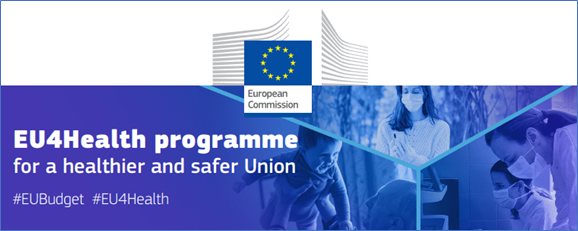
Following the COVID-19 pandemic, and with a strong commitment to strengthening crisis preparedness and resilience, the EU4Health programme provides support to improve health systems. One of its actions supports health workforce under the on-going seven training projects, which. aim to equip clinical and non-clinical healthcare staff with digital skills and other relevant proficiencies needed to effectively manage crises and transform healthcare systems. This is a very first EU initiative on skills of health professionals of cross-national scope as each of the project covers at least 5 Member States. These initiatives focus on:
- AMR EduCare: Responsible Antimicrobial Usage
The AMR EduCare initiative seeks to enhance the skills of medical professionals, nurses, and health management experts in six Member States. By focusing on responsible antimicrobial usage and lowering prescription rates, the project will empower over 4,000 individuals to take part in combatting antimicrobial resistance.
- E-hospital for Future: Pioneering Digital Skills
E-hospital for Future aims to promote digital skills within hospital settings, including clinical practice, data and AI use, patient management, and hospital administration. It will also provide training on stress management and the transformation of primary and long-term care. At least 1,000 health professionals in five Member States and two non-EU countries will benefit from this comprehensive training.
- Gynaecological Endoscopic Surgical Education: Advancing Surgical Skills
This project is dedicated to enhancing gynecological endoscopic surgeries and remote patient follow-up, aiming at empowering doctors and nurses with advanced skills. Additionally, it will invest in robotics, motivation, and communication proficiencies, ultimately training at least 600 professionals in eight Member States
- Digital Skills in Oncology: Empowering Cancer Care
Dedicated to improving cancer care, this project will provide training for doctors and nurses, emphasizing interprofessional education, communication skills, person-centred care, digital tools and Artificial Intelligence usage. It also includes modules for non-clinical staff to improve cancer care organisation, crisis response models, and leadership in healthcare. The training target is set at 240 people in six Member States.
- Health Professionals’ and the “DigitAl team SkillS Advancement
This project will equip doctors and nurses with both general and advanced digital skills, allowing them to effectively manage change and reach digital maturity in healthcare settings. A digital health literacy strategy will be developed, with the goal of increasing digital literacy across the healthcare sector. This initiative aims to train 550 professionals in six Member States.
- Dynamic Digital Skills for Agility and Resilience in Medical and Allied Professions
With the goal of strengthening digital skills, this project will prepare doctors and nurses to address current and emerging healthcare challenges. It also includes a module on the wellbeing of health professionals within multidisciplinary teams. Additionally, surveys will be conducted to name training needs related to healthcare transformation and wellbeing among healthcare professionals. This training will benefit 700 people from nine Member States.
- Transition Digital TRANSition and dIgiTal resIlience in Oncology
For doctors and nurses working in cancer care, this project will provide essential training in digital skills and other relevant areas to improve surge capacity and resilience. It will also offer courses on shared decision-making, cancer prevention, monitoring, and support care. The project's scope includes non-clinical staff, focusing on improving cancer care organisation and digital innovations. This ambitious project aims to train 10,800 professionals in 14 Member States.
The EU4Health programme's commitment to training initiatives is an important step towards creating a resilient and adaptable healthcare workforce. By equipping healthcare professionals with essential digital skills and fostering a culture of continuous learning, these projects are poised to strengthen healthcare systems and contribute to long-term health challenges.
Digital skills are important - Get involved in the European Year of Skills!
Are you a working to develop the right skills for the digital transition? Have you been in touch with your National Coordinator yet? If not, do not hesitate to connect! Check the full contact list here. More information on what is happening on the ground and in your country is coming soon. Please visit our website and the map of events regularly. Find skills-related activities near you and be a part of the European Year of Skills!
Details
- Publication date
- 16 October 2023
- Author
- Directorate-General for Employment, Social Affairs and Inclusion
